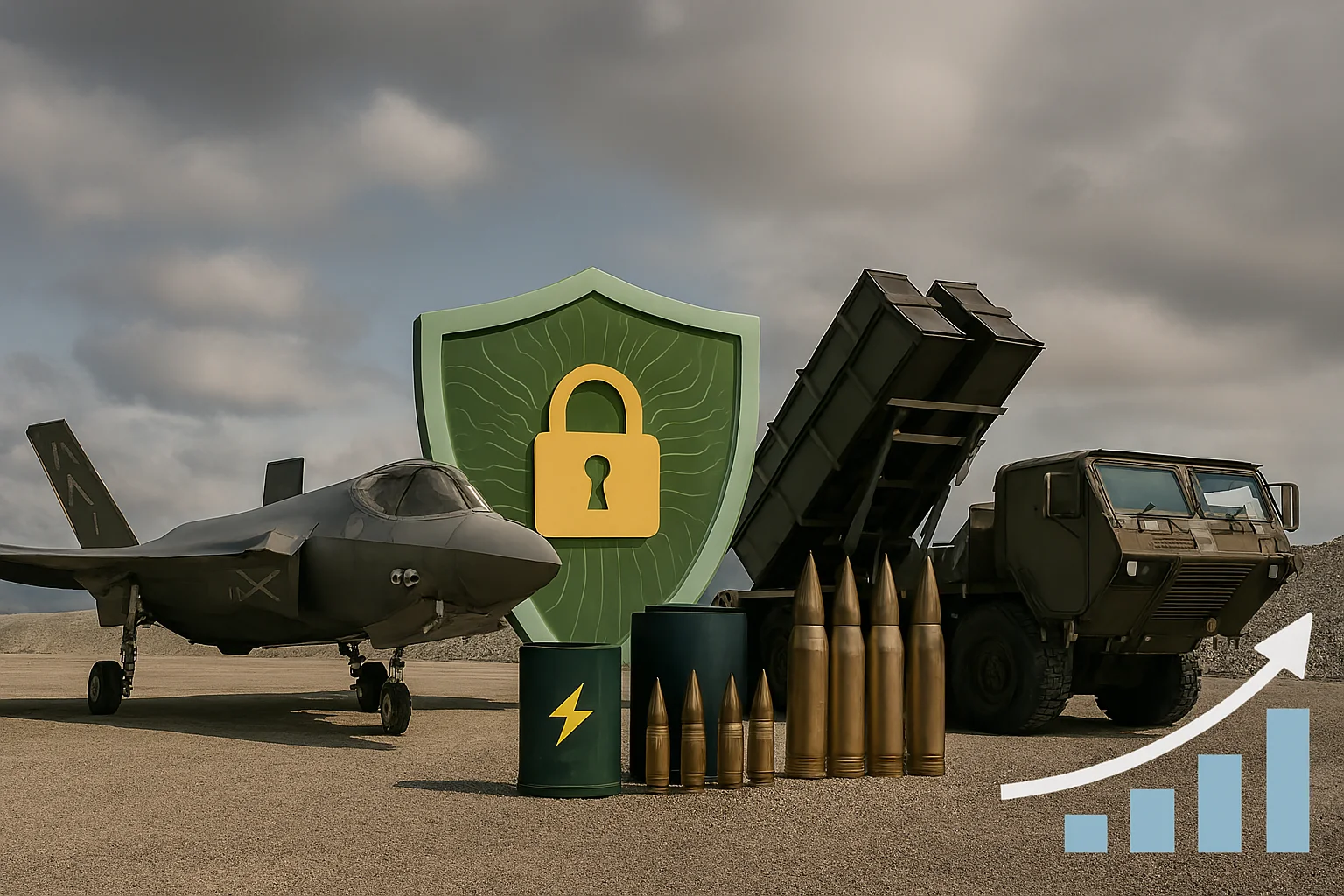Periods of market volatility often leave investors searching for safe havens. When the global economy is unpredictable, certain industries demonstrate resilience, and one of the most reliable sectors is defense. Companies tied to aerospace, cybersecurity, weapons systems, and national security contracts tend to hold up even when other markets stumble. This article explores the best defense stocks to consider if you want to safeguard your portfolio during uncertain times.
See Also 5starsstocks.com Defense: The Truth Behind the Buzz
Why Defense Stocks Provide Stability
Defense firms operate differently from traditional consumer or technology companies. Instead of relying on fluctuating demand, their revenues are largely backed by long-term government contracts. Countries rarely reduce defense budgets during crises; in fact, defense spending often increases when tensions rise.
Consistent Government Contracts
Most major defense contractors have multi-year agreements with the U.S. Department of Defense and foreign allies. These steady inflows of capital help shield companies from economic downturns.
Global Security Concerns
Rising geopolitical tensions, conflicts, and the need for advanced defense technologies continue to drive growth. Even when the broader market suffers, defense firms remain crucial to national security, making them resilient investments.
Dividend Reliability
Many defense companies have a history of paying dividends, making them attractive to income-seeking investors during uncertain times.
Factors to Consider Before Investing
Before buying shares in this sector, it’s important to evaluate certain factors that influence performance.
Government Budgets
Defense spending is tied to federal budgets. While U.S. spending remains high, shifts in policy or election outcomes can influence which companies benefit most.
Innovation and Technology
Firms investing heavily in next-generation technology—such as drones, hypersonic weapons, and cybersecurity—are better positioned for long-term growth.
International Presence
Companies with international contracts diversify their revenue streams, reducing dependency on one nation’s policies.
Financial Health
Reviewing debt levels, free cash flow, and earnings growth is essential. Solid balance sheets ensure these businesses can weather downturns.
Best Defense Stocks for Portfolio Protection
Below are some of the most reliable defense companies that have consistently performed well in challenging times.
Lockheed Martin (LMT)
Lockheed Martin is one of the largest defense contractors in the world. Its portfolio includes fighter jets like the F-35, missile defense systems, and space technology. With billions in annual contracts from the U.S. and allied nations, Lockheed remains a cornerstone for investors seeking stability.
Why It Stands Out
- Long-term defense programs provide steady revenue
- Expanding footprint in space exploration
- Strong history of dividends and shareholder returns
Northrop Grumman (NOC)
Northrop Grumman has established itself as a leader in autonomous systems, cybersecurity, and space technology. The company plays a critical role in building next-generation defense systems such as the B-21 Raider bomber.
Strengths
- Heavy investment in unmanned systems and artificial intelligence
- Contracts tied to U.S. Air Force modernization
- Balance of defense and aerospace exposure
Raytheon Technologies (RTX)
Raytheon, following its merger with United Technologies, has created a powerful aerospace and defense giant. Its business includes missile defense systems, aircraft engines, and space technology.
Key Advantages
- Diversified revenue across defense and commercial aviation
- Strong presence in missile systems, an area with rising global demand
- Cost-cutting synergies from the merger improving profitability
General Dynamics (GD)
General Dynamics has a broad portfolio, ranging from tanks and submarines to IT services for governments. The company’s Gulfstream business jet unit also provides diversification beyond defense.
Reasons to Watch
- Large backlog of defense contracts ensures steady revenue
- Expansion into IT and cybersecurity services
- Strong balance sheet with consistent dividend growth
Boeing Defense, Space & Security (part of Boeing Co., BA)
While Boeing is often associated with commercial aviation, its defense division remains a critical player. The unit develops military aircraft, satellites, and advanced defense systems.
Why It Matters
- Defense division provides stability amid commercial aviation volatility
- Strong pipeline of international defense contracts
- Investments in space exploration projects offer long-term upside
L3Harris Technologies (LHX)
L3Harris focuses on communication systems, surveillance technology, and electronic warfare. Its specialized offerings make it a crucial partner for U.S. and allied forces.
Highlights
- Strong presence in intelligence and surveillance markets
- Strategic mergers have boosted efficiency and innovation
- Well-positioned for growth in electronic warfare systems
Emerging Opportunities in Defense
While the big names dominate headlines, several smaller firms are carving out niches in the defense market.
Cybersecurity Firms
As warfare increasingly shifts to the digital realm, cybersecurity stocks are gaining importance. Companies providing network defense, encryption, and AI-driven security tools are positioned for strong growth.
Space Defense and Satellites
The “new space race” is transforming defense strategies. Companies working on satellite networks, missile warning systems, and orbital defense technologies are attracting government funding.
Drone and Autonomous Systems
Unmanned aerial systems are becoming essential for modern military operations. Smaller companies specializing in drone technologies may offer substantial growth potential.
Risks of Investing in Defense Stocks
No sector is completely immune to risks, and defense is no exception.
Political Changes
Shifts in government policies can impact defense spending priorities. Certain contracts may be delayed or canceled depending on political leadership.
Ethical Considerations
Some investors avoid defense stocks due to personal beliefs about weapons manufacturing. This can influence demand in certain socially responsible investing funds.
Supply Chain Challenges
Global supply chain disruptions can delay production and affect revenue. Semiconductor shortages, for example, have impacted the aerospace and defense industry.
How to Invest in Defense Stocks
Individual Stocks
Investors can directly purchase shares in leading defense companies through brokerage accounts. This approach offers targeted exposure but requires research into each company’s performance and outlook.
Exchange-Traded Funds (ETFs)
Defense-focused ETFs provide diversified exposure to the sector. Popular ETFs track aerospace and defense companies, spreading risk across multiple firms.
Mutual Funds
Some actively managed mutual funds also include defense stocks as part of a diversified portfolio, though they come with higher fees compared to ETFs.
Long-Term Outlook for Defense Investments
Defense spending is unlikely to decline dramatically in the near future. With rising global tensions, increasing reliance on cybersecurity, and advancements in space technology, the industry has a strong long-term outlook. Investors seeking stability during uncertain times may find defense stocks an essential component of a well-balanced portfolio.
Conclusion
Defense stocks offer a unique blend of stability and growth potential, making them a strong option for investors navigating turbulent markets. Companies like Lockheed Martin, Northrop Grumman, Raytheon Technologies, General Dynamics, Boeing Defense, and L3Harris provide consistent revenue backed by long-term contracts, while emerging players in cybersecurity, space, and drone technology create additional opportunities.
For those looking to protect their investments against uncertainty, the defense sector remains a reliable and strategic choice.


